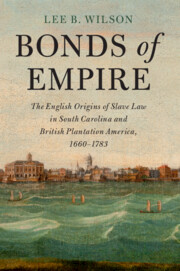 Bonds of Empire
Bonds of Empire Published online by Cambridge University Press: 02 July 2021
Chapter Two examines the specific legal consequences of colonists’ decision to categorize slaves as chattels at law. Properly fit into an English law rubric, colonists in South Carolina and throughout plantation America transformed human beings into a dynamic form of capital that could be bought, sold, and financed with ease. As a practical matter, classifying slaves as chattel gave colonists access to a set a commercial forms and procedures that had coalesced to facilitate long-distance trading. Conditional bonds were among the most important of these, and I follow this legal form of debt as it became part of an expanding Atlantic commercial system. Originating in the Middle Ages, conditional bonds coalesced into a distinctive form that was easier to enforce in common law than other forms of debt. The enforceability of conditional bonds made them surprisingly portable as they travelled across the globe. Although this instrument had originated to suit the needs of an agrarian society, the conditional bond easily accommodated commercial ventures that assumed people could be property. The power of conditional bonds to hold debtors to account in colonial courts made them particularly useful in shoring up a trade that was built entirely upon credit. Ultimately, bonds became an unremarkable feature of commercial life in plantation societies like South Carolina and Jamaica, where creditors relied upon this much older instrument to secure a wide variety of commercial transactions.
To save this book to your Kindle, first ensure [email protected] is added to your Approved Personal Document E-mail List under your Personal Document Settings on the Manage Your Content and Devices page of your Amazon account. Then enter the ‘name’ part of your Kindle email address below. Find out more about saving to your Kindle.
Note you can select to save to either the @free.kindle.com or @kindle.com variations. ‘@free.kindle.com’ emails are free but can only be saved to your device when it is connected to wi-fi. ‘@kindle.com’ emails can be delivered even when you are not connected to wi-fi, but note that service fees apply.
Find out more about the Kindle Personal Document Service.
To save content items to your account, please confirm that you agree to abide by our usage policies. If this is the first time you use this feature, you will be asked to authorise Cambridge Core to connect with your account. Find out more about saving content to Dropbox.
To save content items to your account, please confirm that you agree to abide by our usage policies. If this is the first time you use this feature, you will be asked to authorise Cambridge Core to connect with your account. Find out more about saving content to Google Drive.